range
Latest
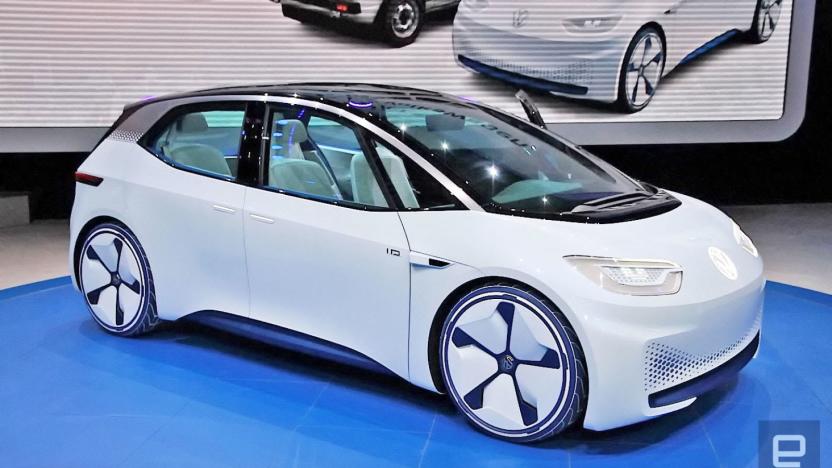
VW's I.D. EV will deliver a 300 mile range for the price of a Golf
Volkswagen's Jürgen Stackmann has revealed a few key details about its mass-market I.D. electric car, including the range and how you'll buy one. It'll have a 550 km range by Europe's new WLTP method (345 miles), which equates to around 290 miles using more stringent EPA testing. The I.D. will also cost the same as "a modern Golf diesel," he said, which is between £19,000 and £25,000, ($24,000 to $32,000). According to Top Gear, the lower end of the price range will be for a model with a smaller battery that offers about 206 miles of range.

2019 Jaguar I-Pace receives 234-mile range rating from the EPA
Jaguar's I-Pace is just getting into consumer's hands, and now the EPA has officially released its range estimates for the all-electric SUV. The vehicle has a range of 234 miles from its 90kWh battery pack, according to the EPA's tests. And compared to its all-electric competition, this range-to-kilowatt ratio is not great. But most people don't compare the I-Pace to the tiny Nissan Leaf, rather its main rival is the Tesla Model X.

Zero Motorcycles' 2019 line-up boasts more power and longer range
Zero Motorcycles has made a name for itself by producing electric bikes that appeal to motorcycle enthusiasts as well as alternative fuel fans. Its bikes have been a hit with thrill seekers and commuters alike, and its newly-announced 2019 line-up makes it easy to see why the company is consistently performing better than all of its competitors combined.
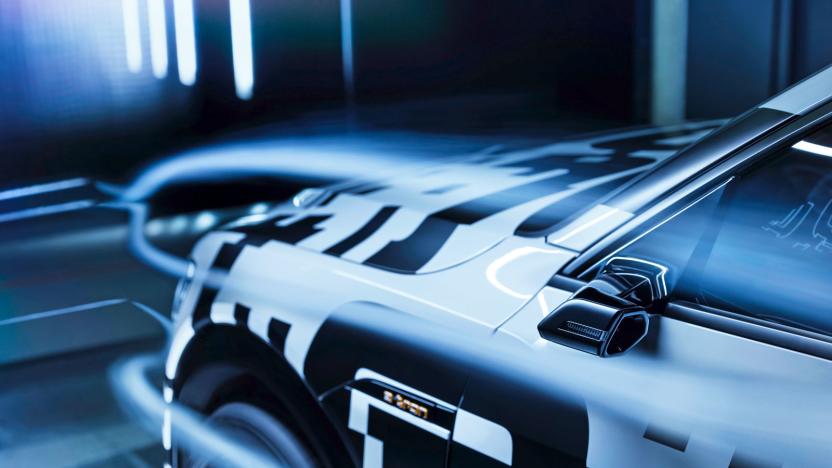
Audi e-tron's optional side cameras will help maximize range
Audi has a novel way to reduce drag and maximize the range of its electric e-tron SUV: it plans to offer an option to nix side mirrors. Instead, the car can use cameras, and display images from them on OLED screens between the instrument panel and the door. Opting for cameras instead of mirrors cuts the car's width by just under six inches, reducing both drag and wind noise. The "virtual exterior mirrors" are also adaptable depending on your situation -- they can be optimized for highway driving, turning and parking.

Energy storage breakthrough could boost EV range and slash charge time
Electric cars could soon have as much range as petrol and diesel cars -- and recharge in a matter of minutes -- thanks to what researchers are calling a "breakthrough" in energy storage technology. Teams from Bristol University and Surrey University have created a new material for supercapacitors, which store electric charge, that could see EVs recharge in as little as 10 minutes compared to the eight hours it can take for EVs with lithium-ion batteries. And according to the researchers, it boasts enough energy density to see EVs surpass even the top range of current leading models, such as Teslas. Elon Musk himself has previously said a breakthrough in EV technology would likely come from supercapacitors, rather than batteries.

Whirlpool plugs Alexa and Google Assistant into its appliances
Whirlpool's smart appliances have already had some voice assistant control, but they're about become particularly AI-savvy. The company has unveiled a 2018 lineup where many appliances support both Amazon Alexa and Google Assistant, letting you control most of your home using the smart speaker (or mobile app) you prefer. You can check the time left on the washing machine, start the dishwasher or change the temperature of your fridge without lifting a finger.

EPA confirms Tesla's Model 3 has a range of 310 miles
Back in August, EPA documents implied that the pricier $44,000 version of Tesla's Model 3 could have a range of 310 miles. Today, the agency confirmed that speculation: The top-tier Model 3 will indeed have a 310-mile range, while the less expensive $35,000 edition will be able to drive an estimated 220 miles before needing to recharge.

Major car companies partner for Europe-wide EV charging network
A group of the biggest names in the car industry have announced a joint partnership to develop a Europe-wide high-power charging (HPC) network for electric vehicles. The venture, named IONITY, draws on expertise from BMW, Daimler, Ford, Volkswagen, Audi and Porsche, and aims to launch 400 HPC stations by 2020.

Ariel's electric supercar promises 1180 horsepower
No sooner had rumors started circulating that car manufacturer Ariel had something special in the works than the company came out and confirmed it was true. An electric supercar with more than 1000 horsepower is on its way, and fittingly for a vehicle capable of such impressive speeds, it'll be arriving soon, unveiled fully in 2019 and on sale in 2020.
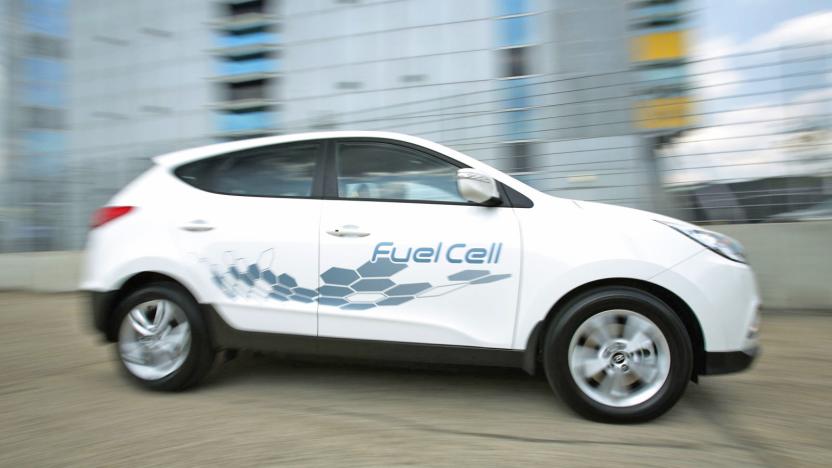
Hyundai shifts focus from fuel cell cars to EVs
Fuel cell champion Hyundai is changing direction with its product strategy, announcing that it will now focus on electric vehicles. The shift comes after Tesla and other electric vehicle manufacturers have gained traction in the field, and following Chinese government backing for battery-powered cars. "We're strengthening our eco-friendly car strategy, centering on electric vehicles," executive vice president Lee Kwang-guk told a news conference, adding that the technology was "realistic". Hyundai now plans to have an electric sedan on the road by 2021, with a range of 500km. Also on the cards is an electric version of its 390km-range Kona SUV, due in the first half of 2018.
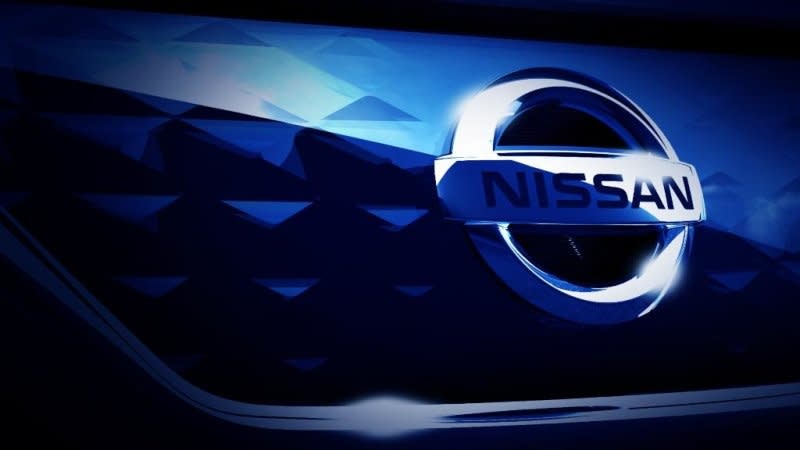
Nissan's next Leaf will be $5,000 cheaper than the Model 3
If you want a cheap EV and are willing to settle for less range, you might end up with a Nissan Leaf and not a Chevy Bolt or Tesla Model 3. According to a (now pulled) leak on car sales site Autobytel, as seen by our sister site Autoblog, the 2018 Nissan Leaf will cost $29,990 for the base model with a 40 kWh battery -- $5,000 less than either the base Bolt or Model 3. With two-thirds the capacity of either model, however, the incoming Leaf will have a range of around 150-160 miles, significantly less than its rivals.
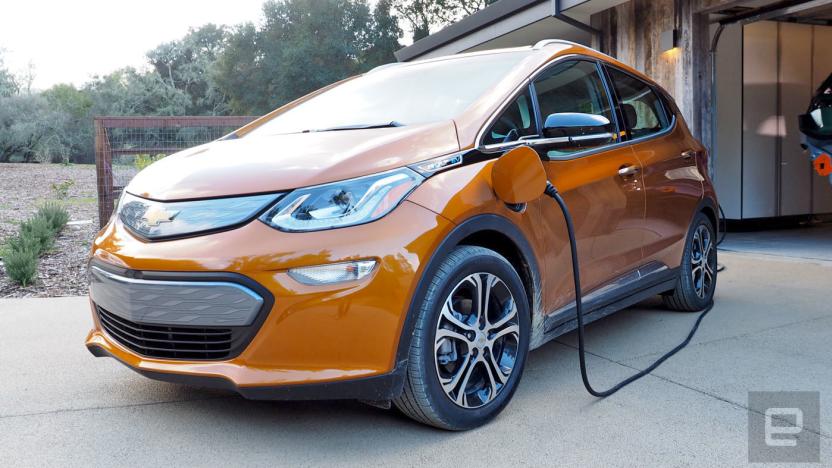
Chevy Bolt outlasts Tesla's Model S in Consumer Reports range test
Consumer Reports just published the results of its range test of the Chevrolet Bolt electric car and came up with some surprising results. While the Bolt is rated for 238 miles of driving by the EPA, the car exceeded that in the Consumer Reports test, squeezing out 12 more miles for a total of 250. That means the Bolt officially beats Tesla's Model S, at least in this particular test. When CR tested the Model S 75D, it got 235 miles, compared to the EPA estimate of 259.

Luxury AGA ovens aren't safe from hackers
In the kitchen, nothing screams "I have money" like an AGA. The expensive British-made cast-iron stoves (or cookers, depending on where you're from) have barely changed in terms of looks much over the last century, but they have got smarter. Thanks to the company's iTotal Control technology, owners of certain models -- costing $10,000 and upwards -- have been able to switch their oven on and off via an app or by sending it a simple text message. It's no doubt helped them remotely prepare dinner, but a security flaw in the system has also left them open to mischievous third parties.

Tesla's latest 100D models focus on range, not power
Tesla has proved that the Model S P100D goes as fast as you'd ever want, and it now has a model that goes farther than ever. As expected, it quietly started selling the Model S 100D with the same battery as the P100D, but lacking the performance tweaks. The new 335 mile range (compared to 315 for the P100D) is the best ever for a Tesla (not counting the upgraded Roadster), and by far, the most range of any EV on the market. At the same time, Elon Musk's company released the Model X 100D with 295 miles of range compared to the performance variant's 289 miles.

Bluetooth is getting big range and speed boosts in 2016
If you're like me, you employ multiple Bluetooth devices on a daily basis. From headphones to speakers and household gadgets, the wireless connectivity drives many of our tech habits. Thanks to the Bluetooth SIG, the company that oversees the wireless technology, the connectivity that we use on the regular will be a lot better in 2016. The group announced today that in order to improve the experience with connected devices that fall under the Internet of Things (IoT), its making some big updates. While the changes are aimed at smart home gadgets, industrial automation and location-based services, Bluetooth connections in general will have four times the range and a 100% speed boost without requiring more power. This means faster data transfers for medical uses, for example. The Bluetooth SIG is also working on mesh networking so that a collection of individual devices could work together to blanket an entire area or building. This would have a major impact on homes, with the potential for all of those connected wares to work more efficiently. Of course, it means that setups like iBeacon and Google Eddystone could see improvements, too.

GE's smart appliances let you take control with your phone
It's now fairly easy to get at least a few connected appliances, but it's still rare to see a full range of them. What if you want to outfit your whole home with smart equipment? GE thinks it has an answer with its new Profile line. The series' dishwasher, fridge, laundry combo, ovens and water heater all give you control from a smartphone. You can preheat your oven before you get home, or tell your water heater that you're going on vacation. Your washer will let you know when your clothes are done, and your fridge will warn you if someone left the door open. Only the ovens are available today, though, so don't start planning a home technology revamp just yet. While the water heater arrives in February, you'll have to wait until the spring to get either the fridge or the laundry pair -- and the dishwasher won't arrive until 2015 is almost over.

Tesla Model S now has $6,500 Performance Plus option for more range, better handling
Current or wannabe Tesla S owners can now opt for a Performance Plus option that adds a bit of range and a lot of extra handling -- and the whole idea came from none other than McLaren. After a journalist told Elon Musk that his nimble sedan was nonetheless outdone by a McLaren MP4-12C supercar (duh?), Tesla's engineers got to work tweaking the suspension and adding new Michelin tires. The latter boosts range by 6 to 12 miles over the stock rubber, while the whole package adds more cornering grip and acceleration "while maintaining ride quality," according to the company. Current owners can get the option retrofitted for $13,000, but if you're still kicking tires, it'll add $6,500 to your total Tesla S bill for the up-rated suspension bits, plus another $3,500 for the optional 21-inch wheels. Sounds tempting for a poor-man's McLaren, and given the new financing options, you might even be able to justify it. Update: We've updated this post to clarify pricing. The 21-inch wheels are not included in the $6,500 Performance Plus package.

Laser scans objects in 3D from half a mile away, scientists just need reason to use it
3D scanning at a range of 0.62 miles? It just became possible, thanks to a laser camera developed by physicists at Heriot Watt University in Edinburgh, UK. You can pretty much see how it works from the images above -- laser beams are bounced off the target and the duration of their return journey is measured precisely enough to detect millimeter depth changes even at extreme distances. Speaking of which, the researchers believe they could pump the range up to 10 miles with a bit of extra research, and even shrink the blaster down to make it "fully portable" in less than five years. Who knows, someday it might even work around corners. But there's a problem: skin doesn't reflect the beams properly, which means people can't be accurately scanned unless they also happen to be ringwraiths. As a result, the researchers seem slightly at loss as to what to do with the technology, with their best suggestions so far being watching the growth of foliage or tracking the movement of rocks. We'd try to think up some other ideas, were it not for the distracting and utterly irrelevant Nazgul v Wilhelm video embedded after the break.

Nissan Leaf to get minor range boost, prove Moore's Law doesn't apply to EVs
Fifteen months and 10,000 American sales later, Nissan is preparing a 2013 overhaul of its Leaf EV. What green and fresh bounties can we expect? Leather seats, a "darker" interior and more efficient heater, which could let the EV go up to 20-25 miles further in cold-weather conditions. Sounds minor to our comfortably warm ears, and there's no specific mention of inductive charging (depicted above) either. On the other hand, the 2012 model already hiked up prices and Nissan probably has to stick closely to the current $35,000 bracket or risk being run down by another all-electric, all-emotional hatchback that's also due next year.

Terahertz bandwidth: the key to 1,000x faster smartphones, laptops and pipe dreams
Much like carbon nanotubes and quantum computing, terahertz technologies have been promising miracles for nearly as long as humans have been able to distinguish water from fire. We exaggerate, but barely. A crafty team assembled at the University of Pittsburgh seems to have no qualms with moving forward, however, recently announcing a new physical basis for terahertz bandwidth. Those involved managed to have success in generating a frequency comb -- "dividing a single color of light into a series of evenly spaced spectral lines for a variety of uses -- that spans a more than 100 terahertz bandwidth by exciting a coherent collective of atomic motions in a semiconductor silicon crystal." For those who managed to make it through the technobabble, we're told that the ability to modulate light with such a bandwidth could "increase the amount of information carried by more than 1,000 times when compared to the volume carried with today's technologies." Smartphones, computers and even airline check-in kiosks that operate 1,000 faster than they do today? Sure, we'll take that. But, how about give us a ring when Wally World deems it ripe for commercialization? We'll be waiting -- pinky promise.









